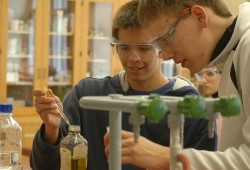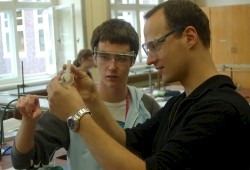IB Chemistry at FKG
Combined Higher Level/Standard Level course outline
Chemistry - an experimental science that combines academic study with the acquisition of practical and investigational skills
The IB Chemistry Higher Level/Standard Level course is designed to bring the students on a level of knowledge to get a general understanding of how science “works”. Chemistry is a prerequisite for many other courses in higher education, such as medicine, biological science and environmental science and serves as useful preparation for employment. The students are supposed to develop an appreciation of the possibilities and limitations associated with science and technology. Furthermore, the course will enable the students to apply and use a body of knowledge including methods and techniques of science in general or those unique to the subject of chemistry. The students will be trained to be patient and persistent in solving problems in a variety of contexts. Additionally, the students should be able to present their results and to communicate clearly with other people dealing with the same or similar matter. Finally, the course members ought to appreciate historical and multicultural aspects of chemistry.
To achieve those objectives the course will provide opportunities for scientific exploration and creativity within global contexts. For the course on Standard Level, no specific background or deeper knowledge of science is presumed. The students approach to study, characterized by the specific IB learner profile attributes – inquirers, thinkers and communicators – will be significant here. For students considering the study of chemistry at Higher Level some previous exposure to the subject is strongly recommended. The core topics for both levels are the same; higher level students are taught on a more explanatory, in-depth advanced level.
The two-year chemistry course will include the essential principles of the subject but also, through a selection of a compulsory option, will allow some flexibility to tailor the course to meet the needs of the students. Short histories of chemical pioneers and events are also going to be part of the lessons. Furthermore, we keep in touch with the renowned chemistry department of Goettingen University, which has always been a centre of internationally orientated excellent research since the university's foundation in 1737. The course covers all the core topics of the new 2023 syllabus. Additionally, an interdisciplinary project (“Collaborative Science Project”) gives the students an opportunity to share and explore natural science knowledge.
Chemistry is an experimental science that combines academic study with the acquisition of practical and investigational skills. Throughout the course, continuous investigations are executed by the students, preparing them for their Scientific Investigation. As an important part of the final assessment each student has to perform one investigation on basis of a personal research question. This will be moderated by the teacher as well as by an external examiner. As mentioned above, the Collaborative Science Project is another practical activity in which “students from different group 4 subjects will work together on a scientific or technological topic to encourage an understanding of the relationships between scientific disciplines and the overarching nature of the scientific method”.
Students get feedback after each core chapter. This should help the students to evolve their work according to the IB criteria and to assess their overall progress throughout the course.
Core topics cover:
- Stoichiometric relationships
- Atomic structure
- The periodic table
- Chemical bonding and structure
- Energetics
- Chemical kinetics
- Equilibrium
- Acids and bases
- Redox processes
- Organic chemistry
- Measurement and data proces
Diplome Programme Subject Brief: Chemistry










